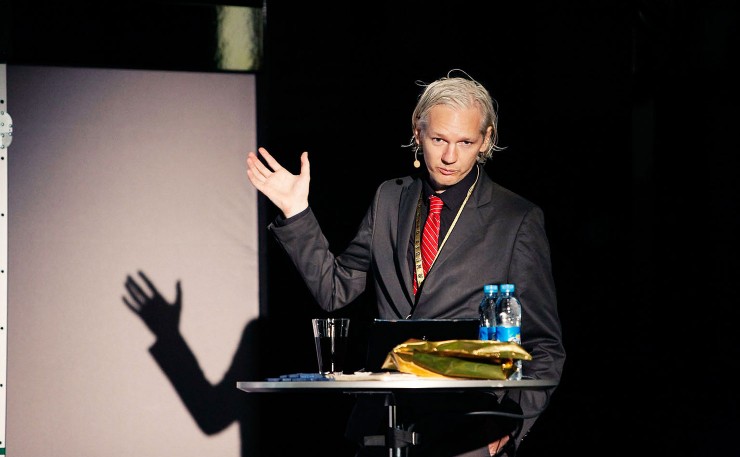Australian journalist Julian Assange remains locked up in a UK prison facing no British charges, having endured years of arbitrary detention and psychological torture. His extradition hearing to the United States is more of the same, writes psychologist Dr Lissa Johnson.
During Senate Estimates Hearings in the Australian Federal Parliament earlier this month, the Australian Minister for Foreign Affairs, Marise Payne and her foreign affairs colleagues were questioned about the treatment of Julian Assange during his recent extradition hearing in London.
The Minister and her two advisors explained to Tasmanian Senator Peter Whish-Wilson that Julian Assange’s treatment in London was “no different” than that of other UK prisoners.
There was nothing to worry about, she assured her parliamentary colleagues.
”Standard” was the word repeatedly used, as though it had been decided well in advance. Routine, in other words. Normal.
What the minster and her colleagues failed to explain, however, is that Julian Assange’s treatment at the hands of Belmarsh prison authorities and Belmarsh Magistrates Court is only “standard” and normal for prisoners charged with terrorism and other violent offences.
What is not “standard” or normal is for Walkley Award-winning Australian journalists to be prosecuted as spies by the United States, and subjected to maximum security conditions as a result.
What is not “standard” is for someone charged with nothing whatsoever under United Kingdom law to be treated exactly like someone charged with terrorism.
It is not standard, nor remotely normal, for journalists with no criminal history, no custodial sentence, and no history or risk of violence to be detained under the harshest and most punitive conditions that UK law enforcement has to offer.
Nor is it standard for publishers to be held behind bullet-proof glass while on trial for their journalism, thereby preventing them from sitting with their lawyers, as if their journalistic skills might break loose and terrorise the court.
In fact, all of this is so far from normal that the International Bar Association’s Human Rights Institute (IBAHRI) issued a statement this week joining “the widespread concern over the ill-treatment of Mr Assange” during his extradition hearing, describing it as “shocking and excessive.” The Institute added that Julian Assange’s treatment was “reminiscent of the Abu Graib Prison Scandal”, adding that “with this extradition trial we are witnessing the serious undermining of due process and the rule of law.”
So much for “usual”, fine and normal.

It is extraordinary that Australia’s Foreign Minister would consider anything about foreign governments treating an Australian journalist as a terrorist and spy to be normal. Unless treating journalists as terrorists and spies is the new normal in Australia.
We do, after all, already have 75 pieces of legislation available to criminalise, prosecute, persecute and silence journalists and their sources. We have secret trials on the way against Witness K and David McBride, which promise to scare off any other brave souls thinking of exposing what the government does wrong. Even the New York Times has called us the world’s most secretive democracy.
I mean, who even knows what went on with Witness J?
Given Australia’s own conduct, the persecution of an Australian journalist by a foreign state might suit the Australian government’s agenda very nicely. It may even explain why Minister Payne was just as dismissive of the torture of an Australian journalist as she was of criminalising journalism.
There could, however, be a more innocent explanation. Perhaps our Foreign Minister and her staff simply fail to grasp the gravity of what has been going on in Belmarsh Magistrates Court.
To be fair, psychological torture is not well understood, nor are the facts of Julian Assange’s case. So here they are.
The background
Julian Assange has been subject to a relentless propaganda campaign, so much so that many well-informed people are hopelessly misinformed, both on the facts of his case, and the realities of psychological torture. And yet, the truth is that the legal process underway in Belmarsh Magistrates Court is yet more propaganda and yet more torture, aimed at criminalising journalism.
At the start of Julian Assange’s extradition hearing on February 24th, James Lewis QC, representing US prosecutors, addressed not the court, but, astoundingly, the media.
In his opening address to launch the press freedom test-case of a lifetime, Mr Lewis QCinstructed the media as to what it should – and should not – say. The irony, sadly, seemed lost on both sides.
Mr Lewis QC took particular care to instruct the media not to focus on the US war crimes that Julian Assange exposed. Sure we murdered some folks was the subtext. But your job is to bury it.
From that point onwards, Julian Assange was a prop in a drama designed to make him look and feel dangerous and violent. While those responsible for the crimes that he exposed sat back and watched. From a comfortable distance.
Moving Julian Assange’s trial from a court in which extradition cases are normally heard – Westminster Magistrates Court – to a counter-terrorism court attached to Belmarsh prison provided the ideal stage for such a drama to unfold. It enabled keeping Julian Assange behind bullet-proof glass flanked by security like Hannibal Lecter, as opposed to the Nobel Peace Prize nominee that he is.
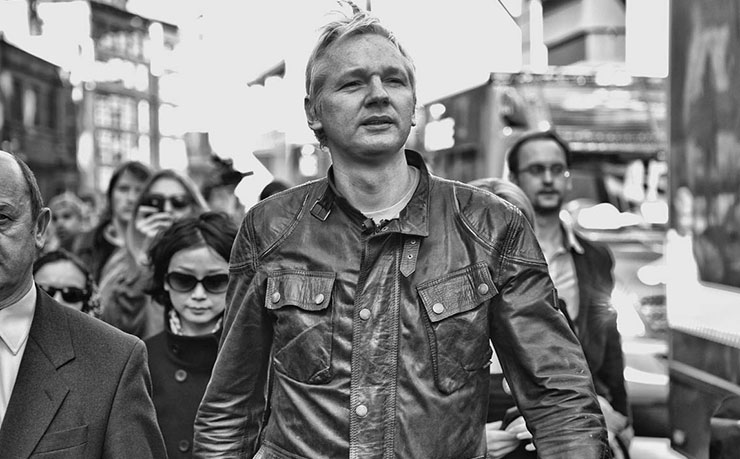
Having demonised Middle Eastern men as terrorists since 9/11, enabling their abuse in rights-free hell-holes such as Belmarsh prison, authorities are now expanding that abusive license to encompass journalists, via Julian Assange.
Moving Julian Assange’s trial to a counter-terror court also enabled denying him his right to sit with his lawyers like a dignified human being. Because, along with handcuffing and strip-searching people repeatedly, all of this is “usual” in Belmarsh prison, which is known as ‘Britain’s Guantanamo.’
Even worse, hearing the extradition request in a counter-terrorism court turned the propagandistic show-trial into yet another instrument of psychological torture.
Psychological torture? What psychological torture? How?
The abuse of the legal system to psychologically torture Julian Assange
Since 2010, the pursuit of Julian Assange for his publishing activities has involved psychological harm inflicted by states, judiciaries and the media. This harm has been so sustained and severe that the UN Special Rapporteur on Torture, Nils Melzer, along with medical experts in torture, have deemed it to constitute psychological torture.
For her role in exposing the evidence of war crimes that Julian Assange published, and refusing to testify against Julian Assange, Chelsea Manning is also being psychologically tortured. Again. News broke today that she has attempted suicide.

According to the UN torture mandate, under international law psychological torture entails “all methods, techniques and circumstances which intend or are designed to purposefully inflict severe mental pain or suffering”.
In addition to this, prolonged psychological torture causes physical and medical harm, as described in this explanatory medical addendum submitted to the Australian Government. The medical harm from psychological torture occurs by virtue of incessant and extreme activation of stress physiology, with potentially grave medical and neurological consequences; and altered brain activity.
In Julian Assange’s case, the severity and duration of his psychological torture has been such that his survival is currently at risk, as the UN Rapporteur on Torture and now over 170 doctors and psychologists, of which I am one, have warned.
Alarmingly, Julian Assange’s treatment in Belmarsh Magistrates Court last month unnecessarily and gratuitously extended every aspect of the psychological torture that he has endured for years.
Julian Assange’s persecutors can get away with this in plain sight because the methods of psychological torture are a well-kept secret. Unlike simulated drowning, hooding or stringing people up naked, the techniques of psychological torment cannot be photographed, and are difficult to see unless they are named.
Accordingly, in the interests of helping onlookers, including government ministers, to recognise the brutality unfolding before their eyes, the key instruments of Julian Assange’s psychological torture are as follows.
A decade of public humiliation and shame
Public shame and humiliation are among the most aversive experiences for human beings. Even subtle ostracism by strangers activates brain centres involved in physical pain. In Julian Assange’s case, the campaign of public vilification has been extreme and relentless.
Julian Assange has been branded a rapist on a world stage for many years, using the Swedish and British judicial and law enforcement systems as tools to manufacture the false perception that women in Sweden had accused him of rape. In reality, neither woman did, and no charges were ever laid.
Yet non-existent “rape charges” have been wielded against Julian Assange for a decade, enabled by grossly inaccurate and misinformed media coverage. The campaign of defamation has been augmented by other unfounded slurs, including tarring him as a terrorist and a foreign agent.
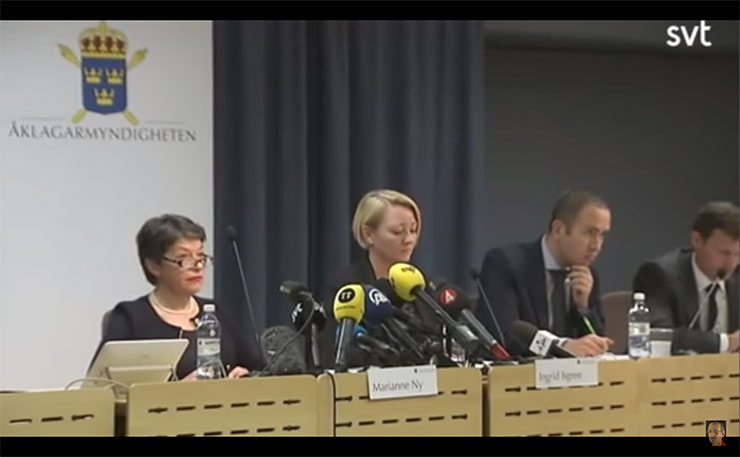
The consequently degraded and debased public image of Julian Assange has made it possible to hold him in maximum security prison despite his lack of violent offending, and force him to sit behind bullet-proof glass, unable to participate in his own trial, thus extending the propagandistic depiction of him as a menace and a criminal.
Such public disparagement and debasement is a recognised method of psychological torture in which “the proactive targeting of victims’ sense of self-worth and identity [occurs]through the systematic and deliberate violation of their dignity… [using]derogatory or feral treatment, ridicule, insults, verbal abuse [and]public shaming, defamation, calumny [or]vilification.”
Julian Assange has experienced, and continues to experience, all of these.
Extreme threat and intimidation
Within the isolating environment of public abandonment fostered by the defamation campaign, Julian Assange has been under incessant threat of extradition to the United States, where a whole of government operation against him has been underway since 2010. This operation has included:
- Being placed on an NSA man-hunting target list;
- Knowing since 2010 that the CIA refused to confirm or deny whether it was planning to assassinate him; and
- US government-aligned security contractors writing in 2011, “Assange is going to make a nice bride in prison. Screw the terrorist. He’ll be eating cat food forever… [Assange] is a peacenik. He needs his head dunked in a full toilet bowl at Gitmo.”
Prominent US figures and officials have called for Julian Assange’s assassination on numerous occasions.
The UN torture mandate writes, “Perhaps the most rudimentary method of psychological torture is the deliberate and purposeful infliction of fear… the prolonged experience of fear can be more debilitating and agonizing than the actual materialization of that fear…. Especially credible and immediate threats have been associated with severe mental suffering, post-traumatic stress disorder, but also chronic pain and other somatic (i.e. physical) symptoms.”
Julian Assange’s extradition hearing represents an undeniable intensification of the “credible and immediate” nature of the threats he faces and the fear they can invoke.
During proceedings the court has heard that the US government had entertained plans to kidnap or poison Julian Assange while he was in the Ecuadorian embassy.
Previously, the UN WGAD, the UN Rapporteur on Torture, Human Rights Watch, Amnesty International and others have all warned of cruel, inhuman and degrading treatment should Julian Assange be extradited to the United States. As he attends court between episodes of handcuffing, strip-searching and waiting endlessly alone in his cell, the life of horrors awaiting him in the United States must plague Julian Assange. How could it not?
Being rendered helpless in the face of threat
Helplessness in the face of threat and danger is extremely tormenting for human beings. In fact, powerlessness against abuse is considered a defining feature of psychological torture. In Julian Assange’s case, at every turn, in the face of grave threats to his life, person and liberty, under pursuit from the world’s most powerful and heavily-resourced nation, Julian Assange has been prevented from acting in self-defence.
For example, on insistence from the Crown Prosecution Service, and in violation of usual procedure, Swedish prosecutors prevented Julian Assange from answering the allegations against him in Sweden, and therefore protecting himself against onward US extradition, by refusing to interview him in the UK.
This was not typical procedure. In other cases, Sweden conducted interviews abroad on 44 occasions during the same period. Sweden also refused to guarantee against onward US extradition, making it impossible for Julian Assange to travel to Sweden to clear his name without placing himself at risk.
Now, in Belmarsh prison, Julian Assange has been prevented from consulting with his lawyers regularly, at times only meeting them twice a month, and he is prevented from sitting with them in court to give instructions.
On top of all of this he has been forced to attend court without reading documents in the case against him. During extradition proceedings, his legal notes were confiscated by prison authorities.
All of this while facing 175 years in US prisons under Special Administrative Measures.

Psychologically it is akin holding someone bound and gagged in the basement while his assailant stands outside sharpening their knives. Julian Assange has endured the torment of such powerlessness, immobilisation and helplessness since 2010.
There is nothing “usual” about any of this, whether in Belmarsh supermax or elsewhere. All defendants have the human right to prepare a defence. Those denied it, whether they’re Julian Asssange or someone else caught up in a counter-terror vortex, are not receiving “usual” rule-of-law, standard, normal democratic fare.
Rendering any defendant this defenceless, let alone in a historic test case, is cruel and it is unusual.
Medical deprivation and neglect
While under such extreme and ceaseless stress, Julian Assange has been denied access to adequate medical care. This denial has included obstruction of treatment for serious physical illnesses dating back to 2015, including painful conditions requiring imaging technology and possible surgery, such as exposed dental pulp. So serious is the medical neglect that over 170 doctors and psychologists from 25 countries have written to the UK and Australian governments demanding his urgent transfer from prison to hospital as a life-saving measure.
As one of those signatories, I and others wrote recently in The Lancet, “We have real concerns, on the evidence currently available, that Mr Assange could die in prison. The medical situation is thereby urgent. There is no time to lose.” We added, “Since doctors first began assessing Assange in the Ecuadorian embassy in 2015, expert medical opinion and doctors’ urgent recommendations have been consistently ignored…. Abuse by politically motivated medical neglect sets a dangerous precedent, whereby the medical profession can be manipulated as a political tool.”
That The Lancet would publish such statements from doctors, denouncing state-sponsored, politically-motivated medical abuse of a publisher – in the UK – is unprecedented. Moreover, Julian Assange’s medical neglect continues in Belmarsh prison to this day. He has not only continued being denied the medical care that a complex case such as his requires, but has reportedly been denied his rights to exercise, both in the prison gymnasium and via daily walks in a small outside space.
In other words, on top of medical neglect, positive health-promoting behaviours as simple as walking have been withheld from Julian Assange. Importantly, exercise, like social contact, is a critical natural antidote to depression. As the court heard during his extradition trial, Julian Assange suffers from clinical depression to the extent his suicide risk is high.
It is cruel, unnecessary and reckless to deprive him of the antidepressant and stress-relieving effects of exercise in this context, particularly while he is exposed to such excessive levels of helplessness and threat. Julian Assange is also at risk of bone problems as a result of years of confinement in the Ecuadorian embassy without sunlight. Depriving him of exercise and outdoor activity adds further gratuitous harm to this existing regime of deliberately inflicted ill-health.
Solitary confinement and isolation
Julian Assange is currently being held purely for remand purposes, so that the US government can re-define journalism as espionage. Even within that abomination of the law, there is no reason whatsoever to remand him in a maximum security facility for violent offenders. Unless, of course, the UK Government has redefined journalism as grievous bodily harm.
In a significant escalation of his psychological torture, remanding Julian Assange in Britain’s Guantanamo has facilitated holding him in isolation for up to 23 hours a day. This is a very serious matter where health, mental health, physical health and torture are concerned.
Prolonged social isolation is extremely psychologically damaging for human beings. Meaningful human social contact is a minimum necessary condition for human psychological and mental functioning, much as food and water are minimum necessary requirements for physical functioning.
Accordingly, as we explained in our doctors’ letter to the Australian Government, “prolonged solitary confinement does not simply cause loneliness, boredom and malaise. It reduces neuronal activity in the brain, leading to potentially severe and long-lasting brain damage, including cortical atrophy and decrease in the size of the hippocampus, the brain region related to learning, memory, spatial awareness and emotion-regulation, along with a 26% increased risk of premature death”.
Solitary confinement can therefore cause significant cognitive impairment, including memory, attention and concentration deficits, which can prove permanent after just a few weeks of isolation. In light of its seriousness, under international law ‘prolonged’ solitary confinement in excess of 15 consecutive days is considered torture.
Despite this, or because of it, Julian Assange has been held in 22-23 hours of isolation per day for many months.
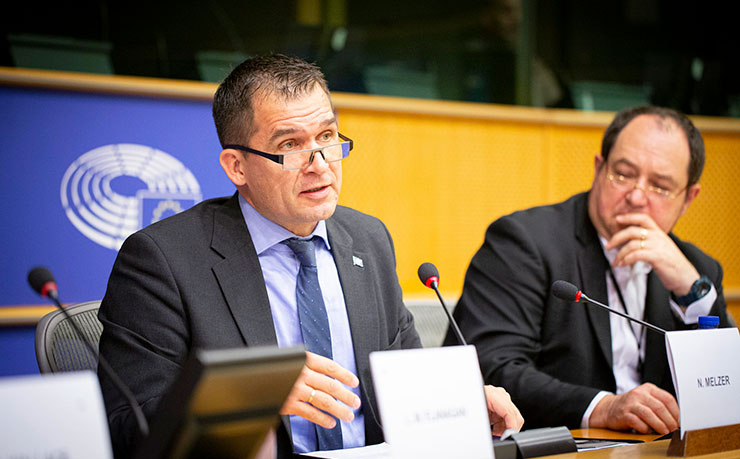
According to the UN torture mandate, “A routine method of psychological torture is to attack the victim’s need for social and emotional rapport…. Persons deprived of meaningful social contact… can quickly become deeply destabilized and debilitated.”
Moreover, depriving someone of social contact for an extended period and then forcing them to stand trial is the psychological equivalent of depriving them of food and water and forcing them to run a marathon. For this reason alone Julian Assange’s extradition hearing should be suspended on urgent medical grounds.
Instead, Julian Assange’s isolation has been cruelly perpetuated in court. Former UK diplomat Craig Murray wrote that Julian Assange “is not [even]permitted to shake hands or touch his lawyers through the slit in the armoured box. [Court authorities] are relentlessly enforcing the systematic denial of any basic human comfort, like the touch of a friend’s fingertips or the relief that he might get just from being alongside somebody friendly.… A tiny bit of human comfort could do an enormous amount of good to his mental health and resilience. They are determined to stop this at all costs.”
Constant surveillance
Julian Assange has been under 24/7 surveillance for years. We wrote in The Lancet, “He was surveilled in private and with visitors, including family, friends, journalists, lawyers, and doctors. Not only were his rights to privacy, personal life, legal privilege, and freedom of speech violated, but so, too, was his right to doctor–patient confidentiality.”
Like the other abusive psychological tactics deployed against him, surveillance is recognised as a form of psychological torture. The UN torture mandate writes that “constant audio-visual surveillance, through cameras, microphones, one-way glass, caging and other relevant means, including during social, legal and medical visits, and during sleep [and]personal hygiene” is used in psychological torture regimes in order to attack a victim’s dignity, privacy and sense of identity.
Even as he fights for his life and liberty in court, when the privacy of lawyer-client privilege could not matter more, Julian Assange is surveilled. Whatever communication he might attempt with his lawyers can be seen and heard by nearby security staff, US prosecutors and intelligence personnel.
Arbitrariness
Julian Assange has been subjected to arbitrariness for the past decade. As a tool of psychological torture, according to the UN torture mandate “when administrative or judicial power is deliberately misused for arbitrary purposes, and when the relevant institutional oversight mechanisms are complacent, complicit, inaccessible or paralyzed to the point of effectively removing any prospect of due process and the rule of law… [this]fundamentally betrays the human need for communal trust and, depending on the circumstances, can cause severe mental suffering, profound emotional destabilization and long-lasting trauma”.
As doctors explained to the Australian Government late last year, “Arbitrariness attacks a person’s sense of control, agency and volition, to the extent that the will to live itself can be fatally undermined. Extreme helplessness, hopelessness, destabilisation and despair, all correlates of suicide, are natural human reactions to an environment that is persistently unpredictable, unresponsive and hostile, regardless of a person’s actions or efforts to influence it.”
Having inspected the conduct of Sweden, the UK and the US, the world’s designated authority on arbitrariness, the UN Working Group on Arbitrary Detention (WGAD), ruled that Julian Assange has been arbitrarily detained since 2010. In 2019 the WGAD further stated that his detention in Belmarsh Prison constitutes ongoing arbitrary deprivation of liberty.
As part of that arbitrariness, rule of law and due process has been consistently violated in pursuit of Julian Assange, as both the UN WGAD and the UN Rapporteur on Torture have stated on numerous occasions and detailed in numerous letters and reports.
The first four days of Julian Assange’s extradition hearing were nothing if not a bonanza of unbridled arbitrariness. Aside from preventing him from participating in his own trial, the prosecution case was a Frankenstein’s monster of dismembered and reassembled parts of different treaties and acts, in which inconvenient sections of the treaty under which extradition is being sought were hacked out, and an excised section of another extradition act was sutured in, to suit US objectives.
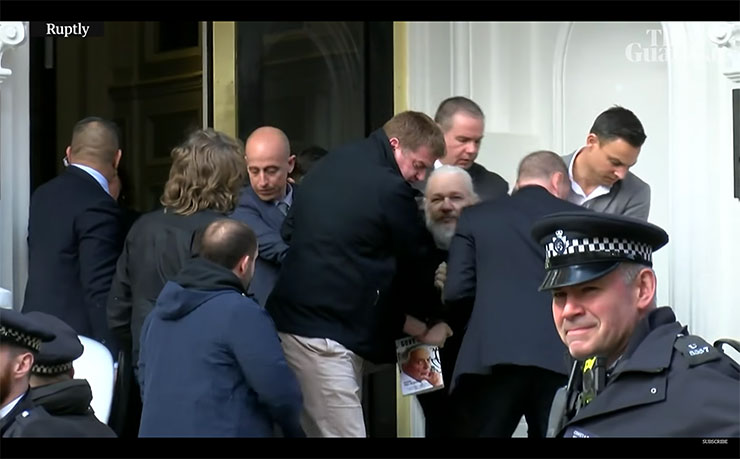
Moreover, according to US prosecutors, US law both simultaneously applied and did not apply to Julian Assange: as a non-US citizen he is subject to the US Espionage Act but not the protections of the US Constitution.
If we set this Frankenstein’s monster loose, the US will be able to arbitrarily apply and withhold whatever sections of its own domestic laws and treaties it likes to foreign citizens in foreign lands, while ignoring international and human rights law entirely.
On the question of whether Julian Assange could sit with his lawyers, the Magistrate reportedly entered the courtroom with her decision already written down, before hearing any arguments on the matter. The legal precedents and principles advanced by Julian Assange’s legal team, it seems, were irrelevant. The decision was pre-ordained.
Worst of all, the hearing is going ahead despite evidence that the CIA spied illegally on Julian Assange’s meetings with his lawyers pre-trial. How can that be? He has been denied the most basic rights as a defendant: lawyer-client confidentiality. It is arbitrary in the extreme.
As if to rub our noses in it, after preventing Julian Assange from speaking with his lawyers in court, the magistrate instructed him to speak through his lawyers. Authorities, it seems, have grown so accustomed to abusing Julian Assange that they forget to even pretend that his hearing is anything other than a show trial.
What everyone should know
All these years of abuse cannot help but take their toll on Julian Assange. He is clearly an extraordinarily strong and resilient individual, but he is still a human being. Just as the human body inevitably succumbs to starvation and assault, so it is with the human mind.
It was foreseeable after years of psychological torture that the Belmarsh Magistrates Court would hear, as it did, that Julian Assange is suffering from trauma and clinical depression, with a high risk of suicide.
It was equally foreseeable that subjecting Chelsea Manning to the same abuses that drove her to suicidality before, and which had been denounced by the UN Rapporteur on Torture at the time, would again render death more appealing to her than a life of torment.
When making the case for their client to sit with them, Julian Assange’s lawyers reminded the magistrate of this, saying, “Mr Assange is a vulnerable person. You are aware of the psychological issues in this case.”
The magistrate, Vanessa Baraitser, addressed her reply to Julian Assange: “I have not been told of any particular aspect of your condition which requires you to leave the dock and sit with your legal team.”
So someone should explain it to her.
Someone should explain to Vanessa Baraitser that Julian Assange is a torture victim being further tortured in court. As Craig Murray noted, sitting with his lawyers is one of the few dignities likely to mitigate in at least some small way against the inhumanities that he is suffering.
Someone should also tell Vanessa Baraitser that she is wrong to call Julian Assange’s suffering a “condition”. Her choice of words serves to linguistically pin the impact of his psychological torture on him. It is like calling the bruises and welts from beatings a disease.
They are injuries.
Vanessa Baraitser should be made aware that the injuries from Julian Assange’s psychological torture are very real, and very serious. The doctors who have written to governments are gravely and genuinely concerned for his life. Even if Julian Assange wins his extradition case on appeal, doctors fear that he will not survive the appeal process.
The extradition hearing should be suspended, immediately, on urgent medical grounds, and Julian Assange released. Journalism is not (yet) a crime, let alone a violent one. There is no justification whatsoever for holding him in Belmarsh supermax. Especially when doing so could kill him.
The doctors know that the UN Rapporteur on Torture, Nils Melzer, has good reason to say of Julian Assange, “Maybe he can hold out for another year, maybe even two. But he might also be finished tomorrow.”
The fact is that the catastrophic effects of psychological torture are inherently unpredictable. Aside from cancer or cardiovascular events, in a stress-induced, immunocompromised state, a simple viral or bacterial infection could prove fatal for Julian Assange. Novel and complex viruses such as COVID-19 pose an even greater threat.
As long ago as 2015 doctors and human rights groups warned that “anything more than a superficial illness would put his health at a serious risk”. Things are even more precarious than that now.
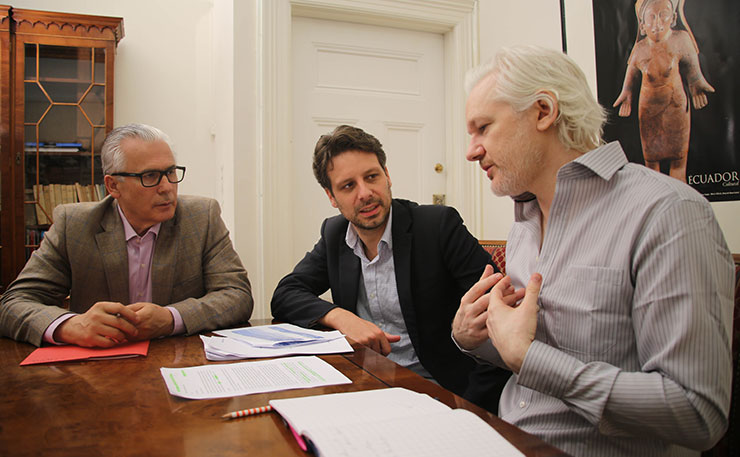
Accordingly, everyone who allows Julian Assange’s incarceration in Belmarsh prison to continue for one more day, or his extradition hearing to proceed, is playing Russian roulette with his life. It is that serious.
In regimes of psychological torture, torture victims such as Julian Assange “are almost always exposed to a combination of methods, techniques and circumstances… [and]in combination and with increasing duration… they have a devastating effect.” Where Julian Assange is concerned, that devastating effect is becoming increasingly apparent.
Before Christmas, Julian Assange called his friend Vaughan Smith to say that he was slowly dying inside Belmarsh prison. Before February’s extradition hearing he told Yanis Varoufakis that he is in a dark place, and that he feels uncertain as to whether he is well enough to judge his own lawyers’ legal strategy.
Which is what doctors have been warning of since late last year. On November 22nd we wrote to the UK Government, “From a medical point of view, on the evidence currently available, we have serious concerns about Mr Assange’s fitness to stand trial in February 2020.”
And yet here we are. All of it dismissed as “usual”, in impassive tones in the Australian Parliament. Which is another hallmark of atrocity and state-sanctioned violence.
One of the social-psychological underpinnings of atrocity such as torture is normalisation, in which sanitising, minimising language is used. Torture and other ill-treatment is depicted as “usual”. Nothing special. Standard. Routine.
However, in contrast to the very normal picture presented during Senate Estimates in Australia, a European MP observing proceedings at Belmarsh Magistrates Court said that Julian Assange’s treatment reminded him of trials in Greece during the dictatorship.
A representative of Reporters Without Borders (RSF) monitoring proceedings told media that Julian Assange’s treatment was very concerning and a “human rights issue”.
Amnesty International has demanded that the US drop its charges against Julian Assange, describing it as a “full-scale assault on the right to freedom of expression”. Human Rights Watch has described the US charges as “a major threat to global media freedom.”
The International Bar Association’s Human Rights Institute has said that if Julian Assange is torture victim, “his extradition would be illegal under international human rights law”. Julian Assange is a torture victim.
An international group of eminent jurists has written to Boris Johnson calling for the UK Government to refuse the US extradition request, and secure Julian Assange’s immediate release. The International Observatory for Human Rights is also urging the UK Government to deny the extradition request.
In Australia the NSW Council of Civil Liberties, the Media Entertainment and Arts Alliance and the Human Rights Law Centre are all calling on governments to oppose the extradition process.
The Parliamentary Assembly of the Council of Europe (PACE), “Europe’s guardian of human rights and democracy”, which oversees the European Court of Human Rights and represents 47 states, has declared that, “Mr Assange’s extradition to the United States must be barred and he must be promptly released”.
In short, the Australian Minister for Foreign Affairs and her colleagues are in an increasingly small group, defined by a narrow set of vested interests within the persecuting states, which is conspicuous by virtue of its distance from the world’s leading human rights, civil liberties and press freedom authorities, all of whom are in agreement with the UN WGAD and the UN Rapporteur on Torture that Julian Assange’s persecution must end.
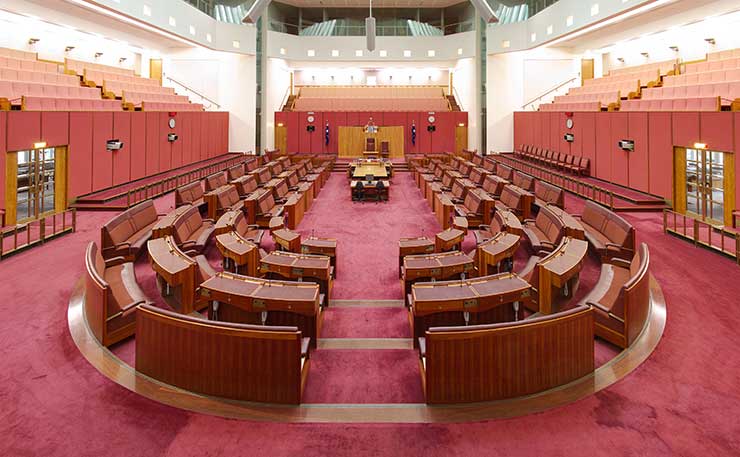
Given that an Australian citizen is at the heart of this global attack on press freedom and human rights, we Australians must hold our government to its human rights obligations according to its own Human Rights Commission.
Because this abuse will not stop at Julian Assange and Chelsea Manning. Glenn Greenwald is in the crosshairs as we speak. Other gentle journalists and whistleblowers the world over are at risk. A senior official at the Organisation for the Prohibition of Chemical Weapons (OPCW) has recently expressed fear for his family’s safety if he tells the truth about what goes on behind the scenes.
Persecutors everywhere will be emboldened by the Assange precedent. Secrecy will run riot. Victims’ stories will go unheard and untold.
And that is what this show-trial is ultimately all about. It is about rendering victims’ voiceless, with no journalists or whistleblowers to tell their stories, nor hold their abusers to account.
That is always why authorities persecute journalists: to get away with more abuse, more torture and more crime.
That is why Julian Assange’s case is the litmus test case of a lifetime.
That is why as citizens we must do everything we can to free Julian Assange, before treating journalists as terrorists and spies becomes the new normal, wherever they may be in the world.
Donate To New Matilda
New Matilda is a small, independent media outlet. We survive through reader contributions, and never losing a lawsuit. If you got something from this article, giving something back helps us to continue speaking truth to power. Every little bit counts.

